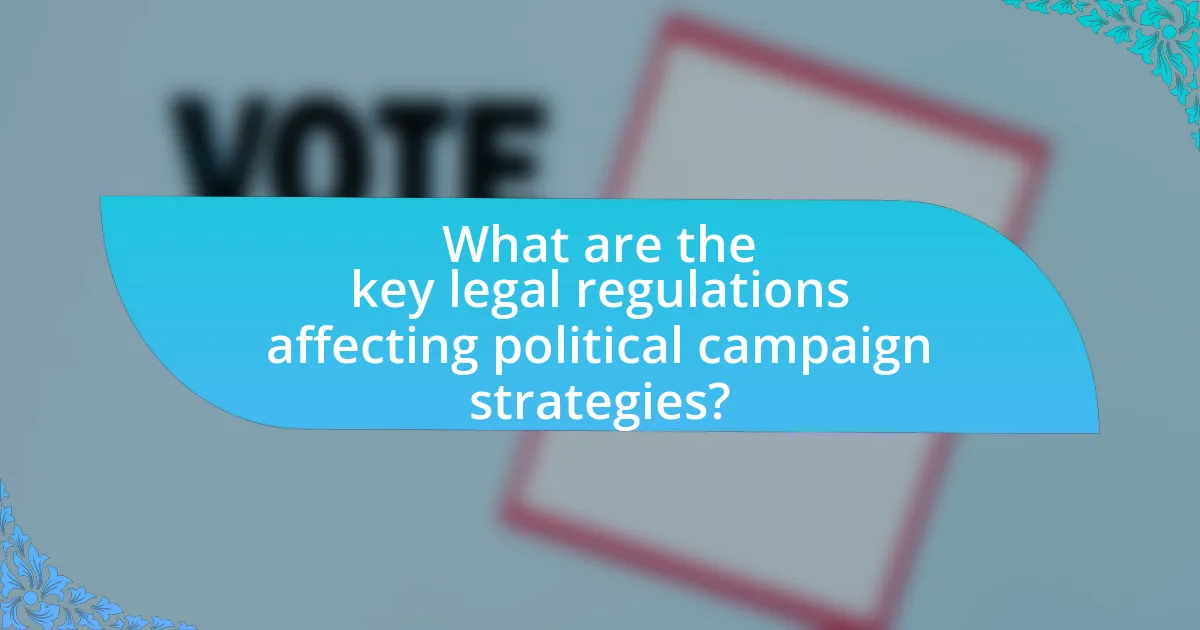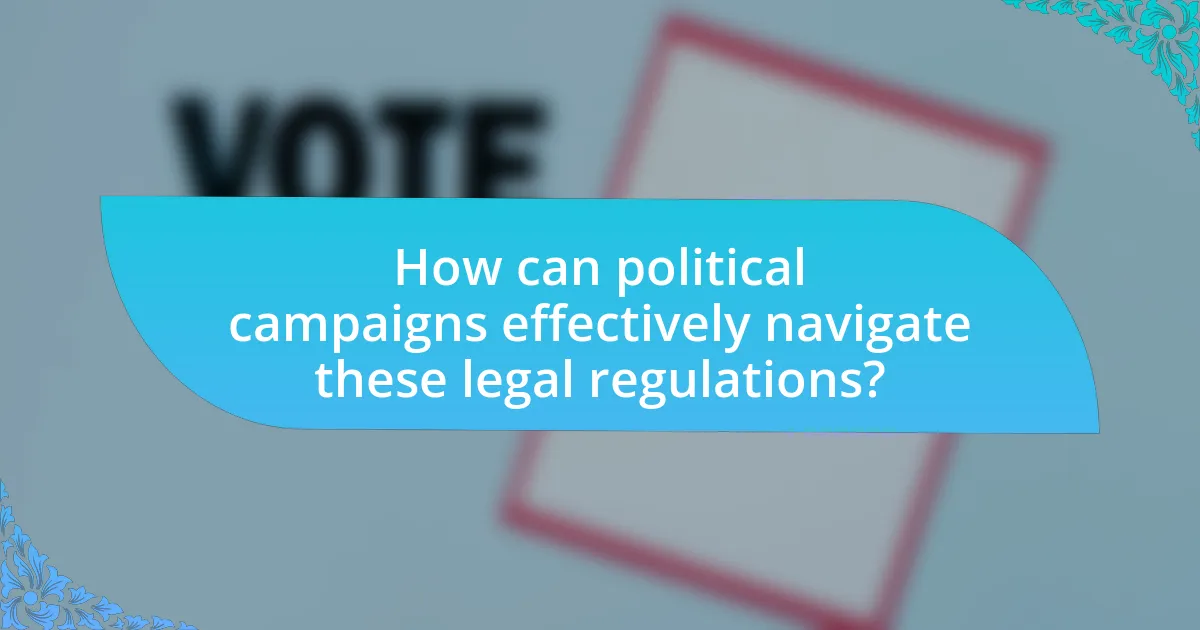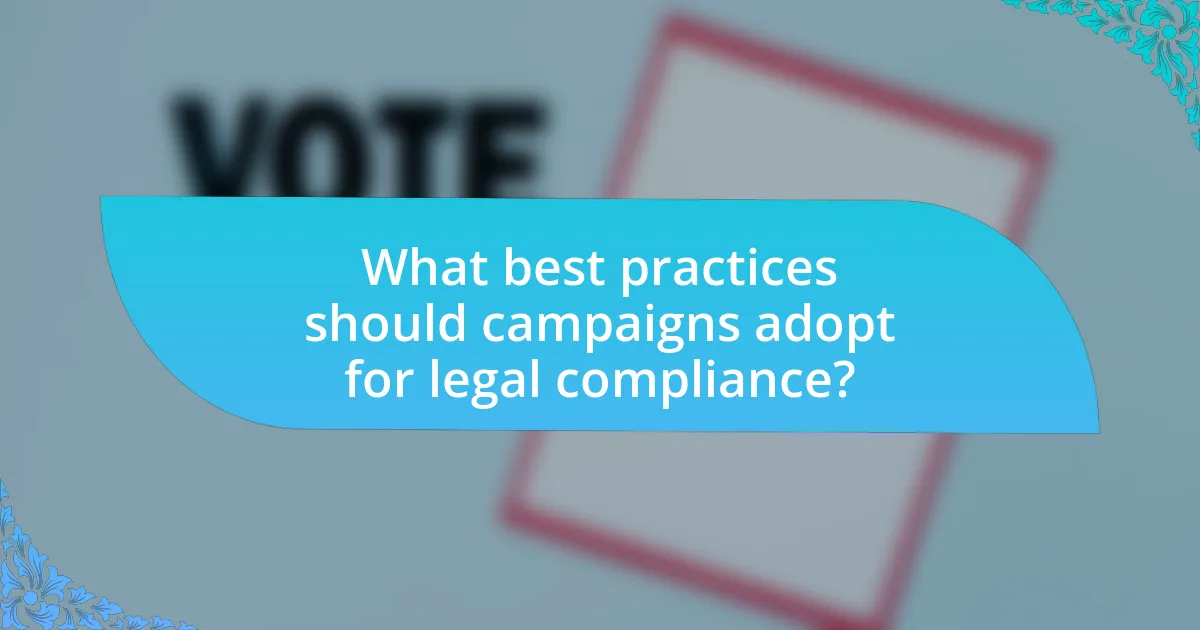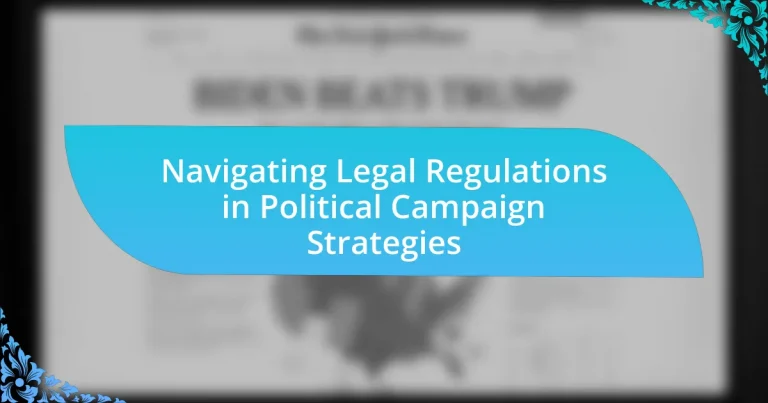The article focuses on navigating legal regulations in political campaign strategies, emphasizing the critical role of federal and state laws in shaping campaign financing, advertising, and candidate conduct. Key regulations include the Federal Election Commission (FEC) rules, the Bipartisan Campaign Reform Act (BCRA), and various state-specific laws that impose additional requirements. The article outlines how these regulations influence campaign strategies, the importance of compliance, and best practices for avoiding legal pitfalls. It also highlights the role of legal advisors and technology in ensuring adherence to campaign laws, ultimately aiming to promote transparency and fairness in the electoral process.

What are the key legal regulations affecting political campaign strategies?
Key legal regulations affecting political campaign strategies include the Federal Election Commission (FEC) rules, which govern campaign financing, contribution limits, and expenditure disclosures. The Bipartisan Campaign Reform Act (BCRA) of 2002, also known as McCain-Feingold, specifically regulates the financing of political advertising and limits the influence of soft money in campaigns. Additionally, state laws can impose further restrictions on campaign activities, including rules on fundraising and advertising. These regulations are designed to promote transparency and fairness in the electoral process, ensuring that candidates adhere to established financial guidelines and reporting requirements.
How do federal laws influence political campaign strategies?
Federal laws significantly influence political campaign strategies by establishing regulations on campaign financing, advertising, and candidate conduct. The Federal Election Commission (FEC) enforces laws that limit contributions to candidates and require transparency in campaign financing, compelling campaigns to strategize around fundraising limits and disclosure requirements. For instance, the Bipartisan Campaign Reform Act of 2002 restricted the use of soft money in federal elections, leading campaigns to adapt by focusing on small donor contributions and grassroots fundraising efforts. Additionally, federal laws mandate that political advertisements disclose funding sources, which affects how campaigns craft their messaging and target their audiences. These legal frameworks shape the overall approach campaigns take in mobilizing support and allocating resources.
What are the major federal laws governing campaign financing?
The major federal laws governing campaign financing include the Federal Election Campaign Act (FECA) of 1971, the Bipartisan Campaign Reform Act (BCRA) of 2002, and the Supreme Court ruling in Citizens United v. FEC (2010). FECA established the framework for regulating campaign contributions and expenditures, requiring candidates to disclose their financial activities. The BCRA aimed to address issues of soft money and increased contribution limits, while Citizens United v. FEC ruled that corporate funding of independent political broadcasts cannot be limited, asserting that such spending is a form of protected free speech under the First Amendment. These laws collectively shape the landscape of campaign financing in the United States.
How do federal regulations impact advertising and communication strategies?
Federal regulations significantly shape advertising and communication strategies by imposing guidelines that ensure transparency, accuracy, and fairness in messaging. These regulations, such as the Federal Election Commission’s rules on campaign finance and the Federal Trade Commission’s advertising standards, mandate disclosures about funding sources and prohibit misleading claims. For instance, the requirement for political ads to disclose who paid for them fosters accountability and informs voters, thereby influencing how campaigns craft their messages. Additionally, regulations on data privacy and consumer protection affect how campaigns target and communicate with potential voters, necessitating compliance with laws like the CAN-SPAM Act and the General Data Protection Regulation. These legal frameworks compel political campaigns to adapt their strategies to remain compliant while effectively reaching their audience.
What state-specific regulations should campaigns be aware of?
Campaigns must be aware of various state-specific regulations that govern campaign finance, advertising, and voter outreach. For instance, states like California require detailed financial disclosures and impose contribution limits, while states such as Texas have different rules regarding the timing and content of political advertisements. Additionally, some states mandate that campaigns register with state election offices and adhere to specific reporting deadlines. These regulations are enforced to ensure transparency and fairness in the electoral process, as evidenced by the Federal Election Commission’s oversight of state compliance and the varying legal frameworks established by state legislatures.
How do state laws differ from federal regulations in campaign strategies?
State laws differ from federal regulations in campaign strategies primarily in their scope and enforcement mechanisms. While federal regulations, governed by the Federal Election Commission, set baseline rules for campaign finance, advertising, and candidate eligibility, state laws can impose additional requirements or restrictions that vary significantly from one state to another. For example, some states may have stricter contribution limits, specific disclosure requirements, or unique rules regarding campaign advertising that are not present at the federal level. This variability means that candidates must navigate a complex legal landscape, ensuring compliance with both state and federal laws, which can impact their campaign strategies and operations.
What are the implications of state-level campaign finance laws?
State-level campaign finance laws significantly influence the dynamics of political campaigns by regulating the amount of money that can be raised and spent. These laws can create disparities in campaign resources, as states with stricter limits may hinder candidates’ ability to compete effectively, while those with looser regulations can lead to increased spending and potential corruption risks. For instance, a study by the National Conference of State Legislatures found that states with higher contribution limits often see more spending in elections, which can skew the political landscape in favor of wealthier candidates. Additionally, these laws can affect voter engagement and trust in the electoral process, as perceived inequities in campaign financing may lead to disillusionment among constituents.

How can political campaigns effectively navigate these legal regulations?
Political campaigns can effectively navigate legal regulations by implementing comprehensive compliance strategies that include thorough understanding and adherence to federal, state, and local laws governing campaign finance, advertising, and voter outreach. Campaigns should establish a dedicated compliance team to monitor regulatory changes and ensure all activities align with legal requirements, such as the Federal Election Commission’s guidelines on contributions and expenditures. For instance, in the 2020 U.S. elections, campaigns that utilized compliance software to track donations and expenditures reported fewer violations and fines, demonstrating the effectiveness of proactive legal adherence.
What strategies can campaigns employ to ensure compliance?
Campaigns can employ strategies such as thorough training on legal regulations, regular audits, and the use of compliance technology to ensure adherence to laws. Training ensures that all team members understand the legal landscape, while regular audits help identify and rectify compliance issues proactively. Additionally, compliance technology can automate monitoring and reporting processes, reducing the risk of violations. For instance, the Federal Election Commission mandates that campaigns adhere to specific financial reporting requirements, and utilizing software designed for compliance can streamline this process, ensuring accurate and timely submissions.
How can campaigns stay updated on changing regulations?
Campaigns can stay updated on changing regulations by actively monitoring legal resources, subscribing to regulatory updates, and engaging with legal experts. Regularly reviewing government websites, such as the Federal Election Commission, provides timely information on new rules and amendments. Additionally, utilizing services that offer alerts on legislative changes ensures that campaigns receive immediate notifications about relevant updates. Engaging with legal counsel who specializes in election law further enhances a campaign’s ability to navigate complex regulations effectively. These methods are essential for compliance and strategic planning in political campaign strategies.
What role do legal advisors play in campaign strategy development?
Legal advisors play a crucial role in campaign strategy development by ensuring compliance with election laws and regulations. They provide guidance on legal frameworks governing campaign financing, advertising, and voter outreach, which helps prevent legal challenges and penalties. For instance, legal advisors analyze campaign activities to ensure adherence to the Federal Election Commission regulations, which mandate transparency in financial disclosures. Their expertise mitigates risks associated with potential legal violations, thereby safeguarding the campaign’s integrity and effectiveness.
What are the common pitfalls campaigns face regarding legal compliance?
Campaigns commonly face pitfalls such as inadequate understanding of election laws, failure to disclose campaign contributions, and non-compliance with advertising regulations. Inadequate understanding of election laws can lead to violations, as many candidates and campaign managers may not be fully aware of the specific requirements in their jurisdiction. For instance, the Federal Election Commission mandates that all contributions over a certain amount be reported, and failure to disclose these can result in fines. Additionally, campaigns often struggle with compliance in advertising, where misleading claims or lack of proper disclaimers can lead to legal challenges. According to a study by the Campaign Legal Center, nearly 40% of campaigns faced issues related to compliance with advertising regulations in the last election cycle, highlighting the prevalence of these pitfalls.
What are the consequences of non-compliance with campaign laws?
Non-compliance with campaign laws can result in severe legal consequences, including fines, penalties, and potential criminal charges. For instance, the Federal Election Commission (FEC) can impose civil penalties that may reach up to $10,000 for violations, and in cases of willful misconduct, individuals may face criminal prosecution, leading to imprisonment. Additionally, non-compliance can damage a campaign’s reputation, leading to loss of public trust and support, which is critical for electoral success. Historical examples include the 2016 election, where several campaigns faced scrutiny and penalties for failing to adhere to campaign finance laws, illustrating the tangible repercussions of such violations.
How can campaigns avoid legal challenges during elections?
Campaigns can avoid legal challenges during elections by strictly adhering to election laws and regulations. This includes ensuring compliance with campaign finance laws, which require accurate reporting of contributions and expenditures, as outlined in the Federal Election Commission guidelines. Additionally, campaigns should avoid misleading advertisements and ensure that all communications are truthful and transparent, as false statements can lead to legal repercussions. Furthermore, campaigns should maintain proper documentation and records of all activities to provide evidence of compliance if challenged. By implementing these practices, campaigns can significantly reduce the risk of facing legal issues during elections.

What best practices should campaigns adopt for legal compliance?
Campaigns should adopt best practices such as ensuring transparency in financial disclosures, adhering to advertising regulations, and maintaining compliance with data protection laws. Transparency in financial disclosures involves accurately reporting contributions and expenditures, which is mandated by the Federal Election Commission (FEC) in the United States. Adhering to advertising regulations requires campaigns to clearly identify sponsors of political ads, as stipulated by the Bipartisan Campaign Reform Act. Additionally, compliance with data protection laws, such as the General Data Protection Regulation (GDPR) in Europe, is essential for handling voter data responsibly. These practices not only mitigate legal risks but also enhance public trust in the campaign.
How can campaigns create a compliance checklist?
Campaigns can create a compliance checklist by identifying relevant legal regulations and systematically outlining the necessary steps to adhere to them. This process involves researching federal, state, and local laws governing campaign finance, advertising, and voter outreach, ensuring that all aspects of the campaign align with these regulations. For instance, the Federal Election Commission provides guidelines on contribution limits and reporting requirements, which can be incorporated into the checklist. By regularly updating the checklist to reflect changes in laws and regulations, campaigns can maintain compliance and avoid legal issues.
What key elements should be included in a compliance checklist?
A compliance checklist for political campaign strategies should include key elements such as legal requirements, ethical guidelines, documentation procedures, and reporting obligations. Legal requirements encompass federal, state, and local laws governing campaign financing, advertising, and disclosures. Ethical guidelines ensure adherence to standards of conduct and integrity in campaigning. Documentation procedures involve maintaining accurate records of contributions, expenditures, and communications. Reporting obligations require timely submission of financial reports and compliance with transparency regulations. These elements are essential to ensure that campaigns operate within the legal framework and uphold public trust.
How often should campaigns review their compliance status?
Campaigns should review their compliance status at least quarterly. Regular quarterly reviews help ensure adherence to evolving legal regulations and mitigate risks associated with non-compliance. According to the Federal Election Commission, frequent assessments allow campaigns to promptly address any discrepancies and maintain transparency, which is crucial for public trust and legal accountability.
What resources are available for campaigns to navigate legal regulations?
Campaigns can utilize various resources to navigate legal regulations, including legal counsel, compliance guides, and online databases. Legal counsel provides tailored advice on specific regulations affecting campaign activities, ensuring adherence to federal and state laws. Compliance guides, such as those published by the Federal Election Commission, outline key legal requirements for campaign financing and advertising. Online databases, like the National Association of Secretaries of State, offer access to state-specific election laws and regulations. These resources collectively help campaigns understand and comply with the complex legal landscape governing political activities.
Which organizations provide guidance on campaign laws?
The Federal Election Commission (FEC) is the primary organization that provides guidance on campaign laws in the United States. The FEC oversees the administration of federal election laws, including campaign finance regulations, and offers resources such as advisory opinions and educational materials to help candidates and political committees comply with these laws. Additionally, organizations like the National Association of Secretaries of State (NASS) and the Campaign Legal Center also provide guidance and resources related to campaign laws at state and federal levels, ensuring that political entities understand their legal obligations.
How can technology assist in ensuring legal compliance in campaigns?
Technology assists in ensuring legal compliance in campaigns by automating the monitoring of regulations and providing real-time updates on legal requirements. Campaign management software can track contributions, expenditures, and reporting deadlines, ensuring adherence to laws such as the Federal Election Commission regulations in the United States. Additionally, data analytics tools can analyze campaign messaging for compliance with advertising standards and truth-in-advertising laws. For instance, platforms like NGP VAN and NationBuilder offer features that help campaigns manage compliance efficiently, reducing the risk of legal violations and associated penalties.
What are the top tips for maintaining legal integrity in political campaigns?
To maintain legal integrity in political campaigns, candidates should adhere to campaign finance laws, ensure transparency in donations, and comply with advertising regulations. Campaign finance laws, such as the Federal Election Commission regulations in the United States, require candidates to report contributions and expenditures accurately. Transparency in donations fosters trust and accountability, as seen in states that mandate public disclosure of donor information. Additionally, compliance with advertising regulations, including truthfulness in political ads, is essential to avoid misleading voters and potential legal repercussions. These practices collectively uphold the legal standards necessary for ethical political campaigning.

















